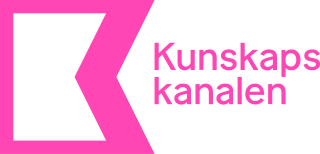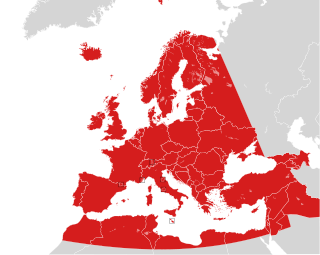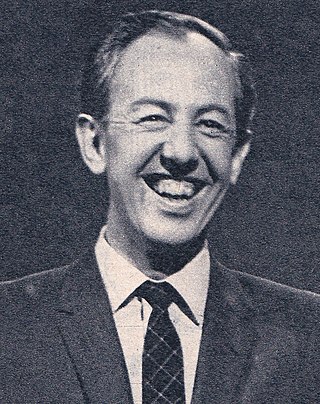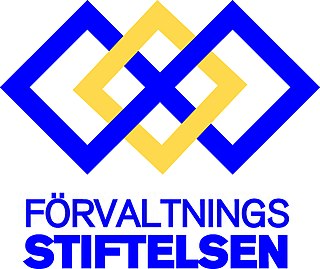
Sveriges Television AB, shortened to SVT, is the Swedish national public television broadcaster, funded by a public service tax on personal income set by the Riksdag. Prior to 2019, SVT was funded by a television licence fee payable by all owners of television sets. The Swedish public broadcasting system is largely modelled after the system used in the United Kingdom, and Sveriges Television shares many traits with its British counterpart, the BBC.

SVT1 is the primary television station of the Swedish public service broadcaster Sveriges Television in Sweden.

SVT2, is one of the two main television channels broadcast by Sveriges Television in Sweden.
Sveriges Radio AB is Sweden's national publicly funded radio broadcaster. Sveriges Radio is a public limited company, owned by an independent foundation, previously funded through a licensing fee, the level of which is decided by the Swedish Riksdag. As of 1 January 2019, the funds stem from standard taxation. No advertising is permitted. Its legal status could be described as that of a quasi-autonomous non-governmental organization.
Boxer TV Access is a Swedish brand owned by Tele2 AB providing pay television channels on the digital terrestrial television network in Sweden. Modeled on the British ITV Digital, it was founded in October 1999. Some channels on the Swedish DTT are free-to-air, but most of the channels require subscription from Boxer. Boxer has claimed to have around 500,000 subscribers by June 2016 when it was acquired by ComHem.

The Swedish International Development Cooperation Agency is a government agency of the Swedish Ministry for Foreign Affairs. Sida is responsible for organization of the bulk of Sweden's official development assistance to developing countries. According to the OECD, 2022 official development assistance from Sweden increased to US$5.5 billion, representing 0.9% of their Gross National Income (GNI).

Kunskapskanalen is a Swedish television channel operated by Sveriges Television (SVT) and Sveriges Utbildningsradio (UR) broadcasting educational and factual programming. The channel broadcasts between 15:00 and 01:00 on all days of the week, having previously aired between 09:00 and 01:00. Kunskapskanalen is broadcast by satellite, cable, and digital terrestrial television to Sweden, by cable to Norway and parts of Finland, and terrestrially on Åland. The channel can also be received over DVB-T in Copenhagen due to its proximity to southern Sweden.

Radiotjänst i Kiruna AB was Sweden's TV licensing body. It was a private corporation, formed in 1988 and based in Kiruna, and upon its formation took over the administration and handling of TV licences from the state-owned telecommunications company Televerket. The company was a subsidiary of the three Swedish public service broadcasters Sveriges Television, Sveriges Radio and Sveriges Utbildningsradio. Under Swedish law, from 1956 until 2019, everyone who owned a television receiver was required to pay the license fee; the last figure was 2400 SEK per annum for the year 2018. The fee was collected by Radiotjänst but administered by the Swedish National Debt Office (Riksgäldskontoret) by means of a special account, the so-called “rundradiokontot”.

The European Broadcasting Area (EBA) is defined by the International Telecommunication Union (ITU) as such:
The "European Broadcasting Area" is bounded on the west by the western boundary of Region 1, on the east by the meridian 40° East of Greenwich and on the south by the parallel 30° North so as to include the northern part of Saudi Arabia and that part of those countries bordering the Mediterranean within these limits. In addition, Armenia, Azerbaijan, Georgia and those parts of the territories of Iraq, Jordan, Syrian Arab Republic, Turkey and Ukraine lying outside the above limits are included in the European Broadcasting Area.
Radio Sweden is Sweden's official international broadcasting station. It is a non-commercial and politically independent public service broadcasting company.

The cabinet of Fredrik Reinfeldt was the cabinet of Sweden from 2006 to 2014. It was a coalition cabinet consisting of the four parties in the centre-right Alliance for Sweden: the Moderate Party, Centre Party, Liberal People's Party and the Christian Democrats.
Sweden introduced its first television licence fee in 1956 costing 25 SEK annually, the same year television was introduced to Sweden. Until 1988, the licence fee was administered by a division of the Swedish state-owned telecommunications company Televerket, when that function was taken over by Radiotjänst i Kiruna AB which was jointly owned by the three public broadcasters Sveriges Television, Sveriges Radio and Sveriges Utbildningsradio.
Television began in Sweden in 1954 with test transmissions, prior to the opening of the first station, Radiotjänst, two years later. A second channel was launched in 1969. Commercial television arrived in the 1980s through cable television and in 1992, the country's first terrestrial commercial channel was launched.

Bengt Walter Feldreich was a Swedish radio and television journalist, television presenter and producer. He worked in public service between 1950 until 1985, well-known for the interview roundtable programme "Snillen spekulerar" on SVT, as well as narrating the annual Christmas Eve broadcasts from the same channel.
The Swedish Press and Broadcasting Authority is a Swedish administrative authority organized under the Ministry of Culture. The Swedish Press and Broadcasting Authority decides on permits, fees and registration for terrestrial television, community and commercial radio; and monitor radio and television programme services, on-demand services and teletext, to verify that the content of radio and television programmes adhere to broadcasting regulations. The Swedish Broadcasting Commission, a decision-making body within the authority, investigate if the content adheres to regulations, after complaints lodged by viewers and listeners, or at the initiative of the Swedish Press and Broadcasting Authority. Additional tasks include verifying that cable companies and IPTV providers retransmit SVT, and that the broadcasting companies are licensed and managed in accordance with Swedish legislation.

Sven Alfred Teodor Jerring was a Swedish radio man who for almost 50 years worked as a presenter, sports journalist, and commentator at the national Swedish broadcasting company AB Radiotjänst, in the mid-fifties renamed to Sveriges Radio.

William Spetz is a Swedish television personality and actor.
Sweden was represented at the Eurovision Song Contest 2016 with the song "If I Were Sorry", written by Oscar Fogelström, Michael Saxell, Fredrik Andersson, and Frans Jeppsson Wall, and performed by Frans himself. The Swedish participating broadcaster, Sveriges Television (SVT), selected its entry through Melodifestivalen 2016. In addition, SVT was also the host broadcaster and staged the event at the Globe Arena in Stockholm, after winning the previous edition with the song "Heroes" performed by Måns Zelmerlöw.
Sameradion is the Sámi languages radio department of Swedish public service broadcaster Sveriges Radio (SR). Sameradion provides news, current affairs, cultural, sports, entertainment, and children’s programming for Sámi across Sweden.

Förvaltningsstiftelsen för SR, SVT och UR is a Swedish public broadcasting organisation that administers the SVT, SR and the UR.













